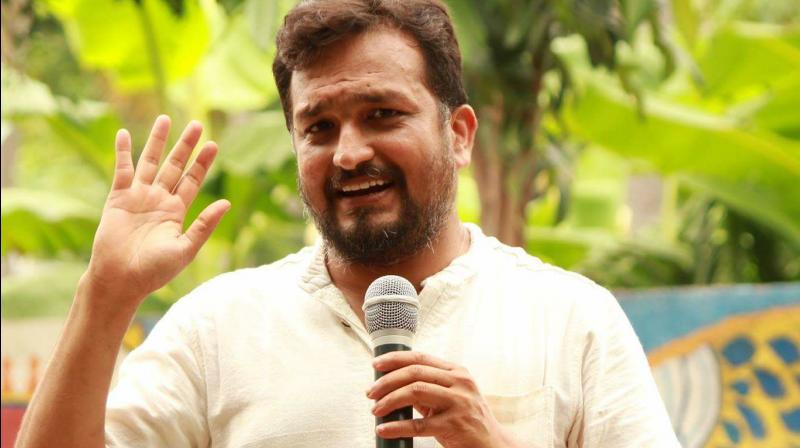Govt discouraging public participation, say activists
A day after Mansoor Ali Khan was arrested, Salem-based activist Piyush Manush was detained late Monday evening.

Chennai: Following the arrests of Mansoor Ali Khan and Piyush Manush, activists protesting the Chennai-Salem Greenfield Corridor say that the government is discouraging public participation in the state.
A day after Mansoor Ali Khan was arrested, Salem-based activist Piyush Manush was detained late Monday evening. Salem Superintendent of Police Georgy George confirmed the arrest and stated that they have both been booked and remanded. “They are being booked under three sections of Indian Penal Code and one criminal law amendment act. It is a non-bailable offence and will be chargesheeted,” he said.
The four sections are 189 - threat of injury to public servants, 506/2- criminal intimidation, 153A- promoting enmity among communities and finally, Section 7 (1) of the Criminal Law Amendment Act.
In a related development, Valarmathi, a social activist in Salem, was arrested on Tuesday, when she along with a few villagers attempted obstruct revenue officials who had come to measure the land meant to be acquired for the project near Achanguttapatti on the outskirts of Salem.
The Centre and state governments seem to be interested in fast-tracking the highway project, believe activists. “The government is answerable to the people. This project is a large one which means people must ask questions and they should be satisfied with the ‘development’,” says Nithyanand Jayaraman, a Chennai-based social activist.
Officials however, say that the statutory requirements for claims, objections have been completed. “Now, the next step is to measure the land, which has begun. Another inquiry will be conducted after that too. All procedures are being followed systematically,” says Rohini Bidari, District Collector of Salem.
Over the past few weeks, the proposed project has been facing stiff resistance from farmers and residents of the villages along the highway.
Will this new road be helpful?
The ‘Chennai-Salem Greenfield Corridor’ is a highways project- designated as N179A and 179B, stretching 277.30 km and funded by the Centre under the Bharatmala Pariyojana, essentially involving an eight-lane highway connecting Chennai and Salem via Krishnagiri district, Tiruvannamalai and Kancheepuram.
According to Chief Minister Edappadi K. Palaniswami, the project is a step in the right direction.
Activists including Piyush Manush are of the opinion that a new road connecting Salem is unnecessary. “There are three different routes. If they want to construct one, ask NHAI to connect other less-accessible places like Chengalpet,” he said before being detained.
Sources say the proposed road would decongest the vehicular congestion on the national highway, especially the Chennai-Tiruchy highway and the Chennai-Bengaluru bypass road. The road, which will start near Vandalur will end at NH 544 bypass of Salem. The road is supposed to pass through Kancheepuram, Tiruvannamalai, Krishnagiri, Dharmapuri and Salem districts. The project will also seek to construct bypass roads each at Kancheepuram and Tiruvannamalai.
According to the pre-feasibility report by Feed Back Infrastructure Pvt Ltd, the consultancy company entrusted with formulating the report, “The connectivity provided through interchanges with residential, commercial and industrial hubs would also fetch direct and indirect benefits. The project is expected to generate development around the abutting towns connected through proposed spurs from the Greenfield highway.”Also, there would be employment opportunities for local people. There would be short and long-term tangible and intangible benefits from this project.
At what cost?
According to the report, the total land required for the project would be 2,792 hectares, acquired from Kancheepuram, Tiruvannamalai, Krishnagiri, Dharmapuri and Salem. Of this, the maximum would be 1,229 hectares from Tiruvannamalai district. The road will pass through 159 villages.
The highway will also cut through 11 reserve forests including Siruvanjur, Nambedu, Alialamangalam, Anandavadi, Ravandavadi, Manjavadi ghat and Pallipatti extension, Jarugumalai and Sorakolathur.
Farmers, whose land will be acquired, are opposing the project fearing a loss of livelihood, threat to the ecosystem and measly compensation offered by the government which a section of them claim is well below the market rate.
The pre-feasibility report however, acknowledges this and says that “legal titleholders” will be provided compensation based on the market value of their land and their immovable property. While the Union Minister of Road Transport and Highways Nitin Gadkari has claimed that the project ‘reduces traffic time from six hours to three hours’, residents disagree, especially since three routes already exist between the two cities.

